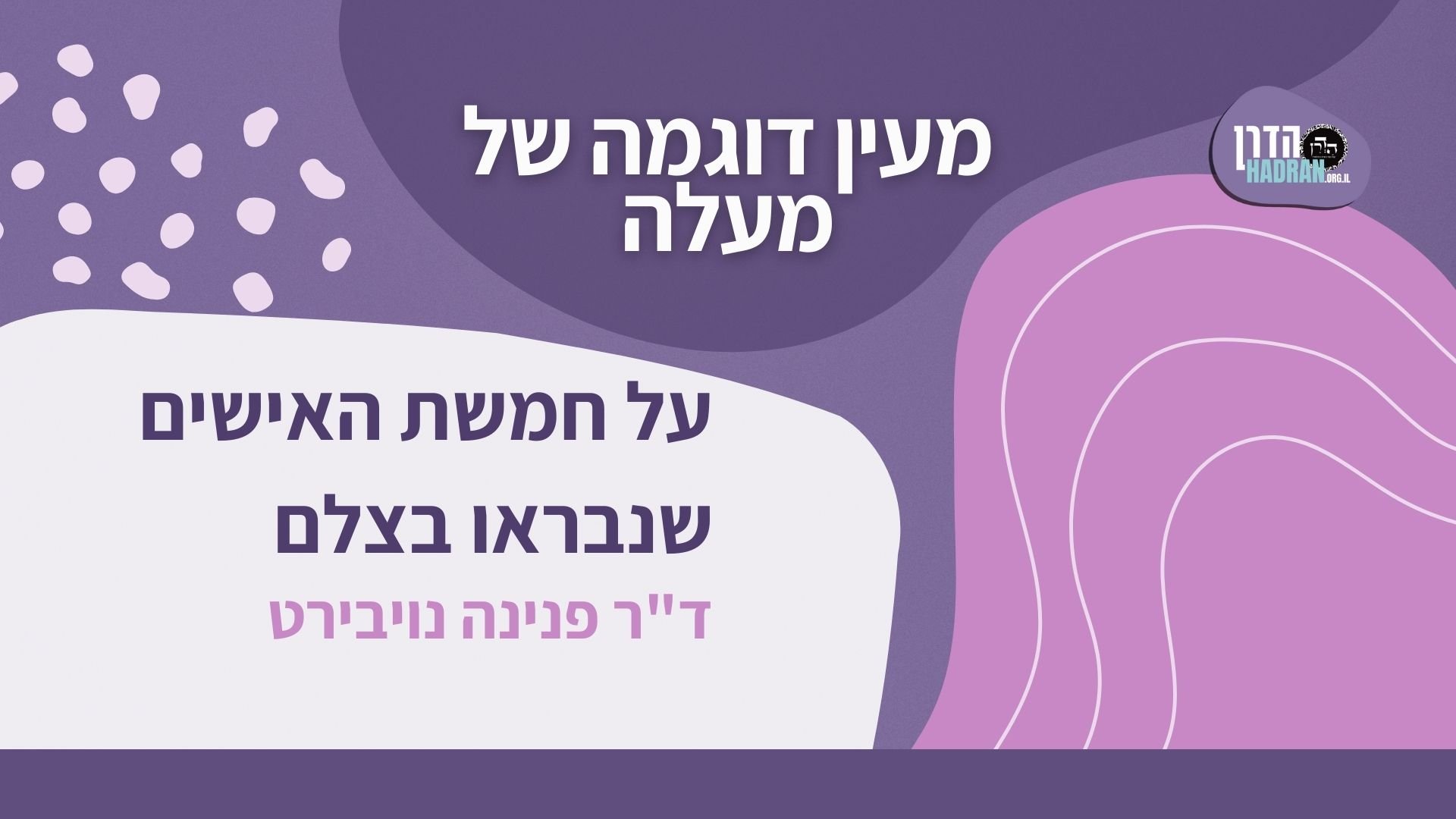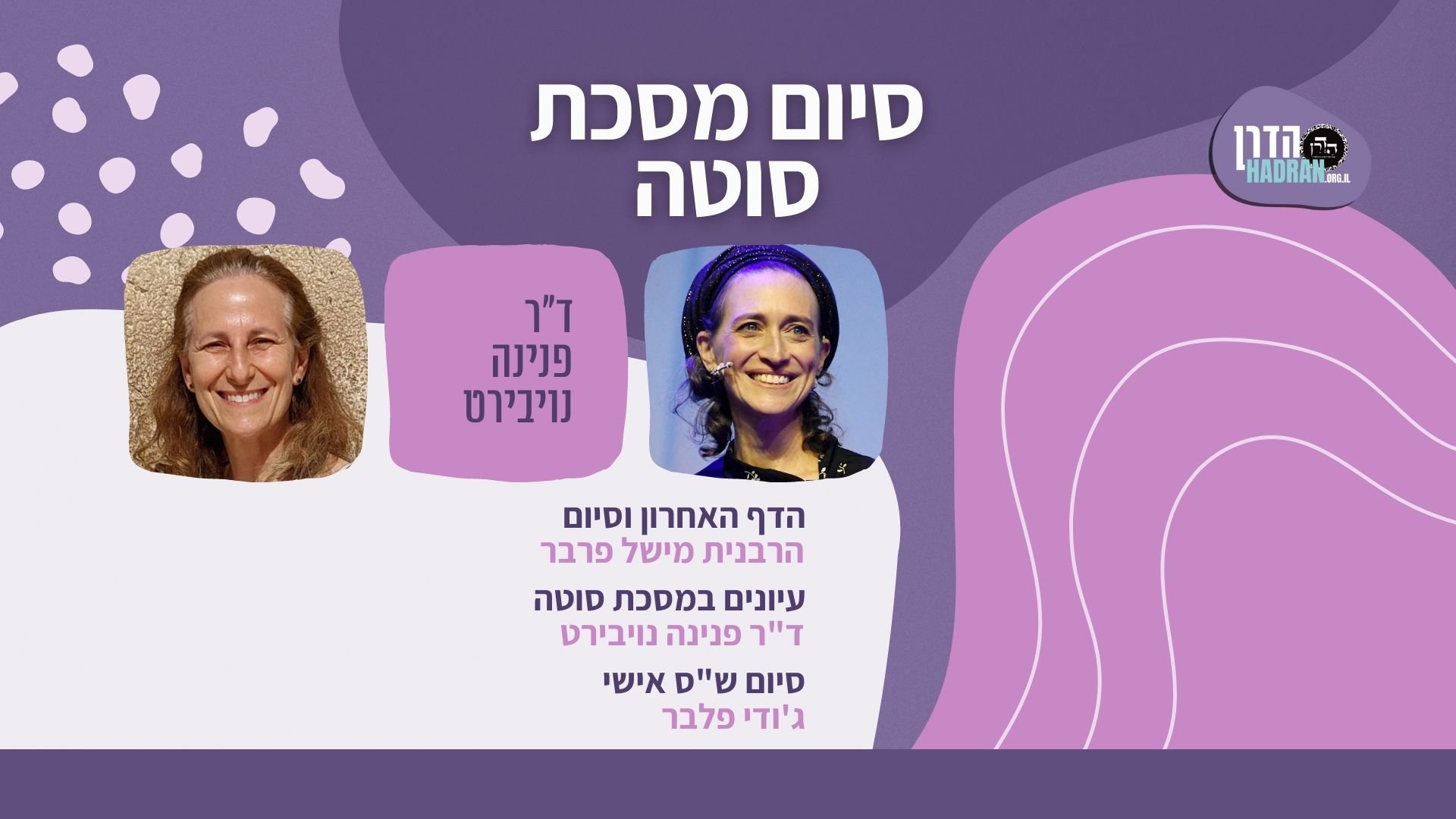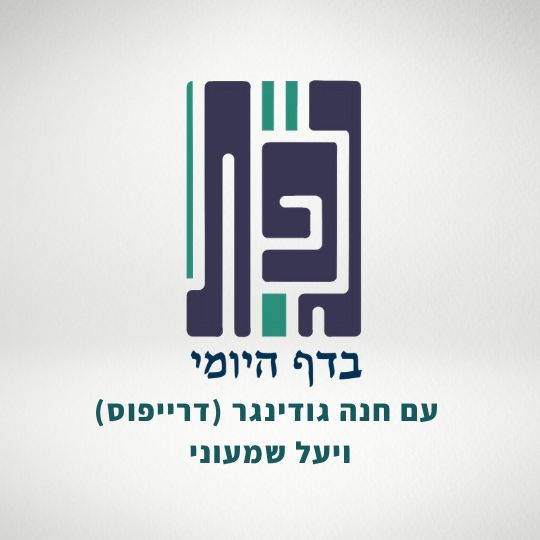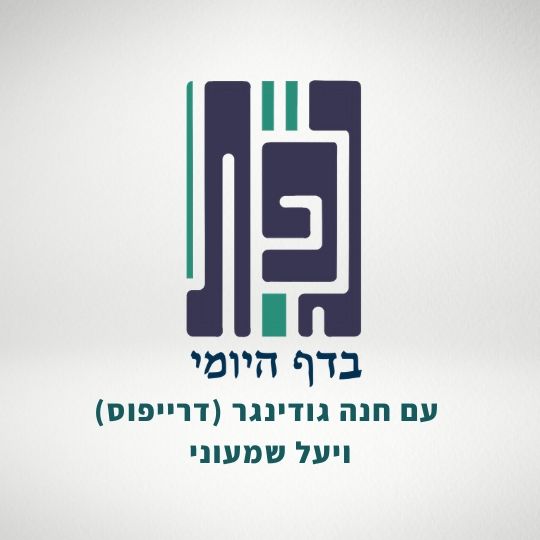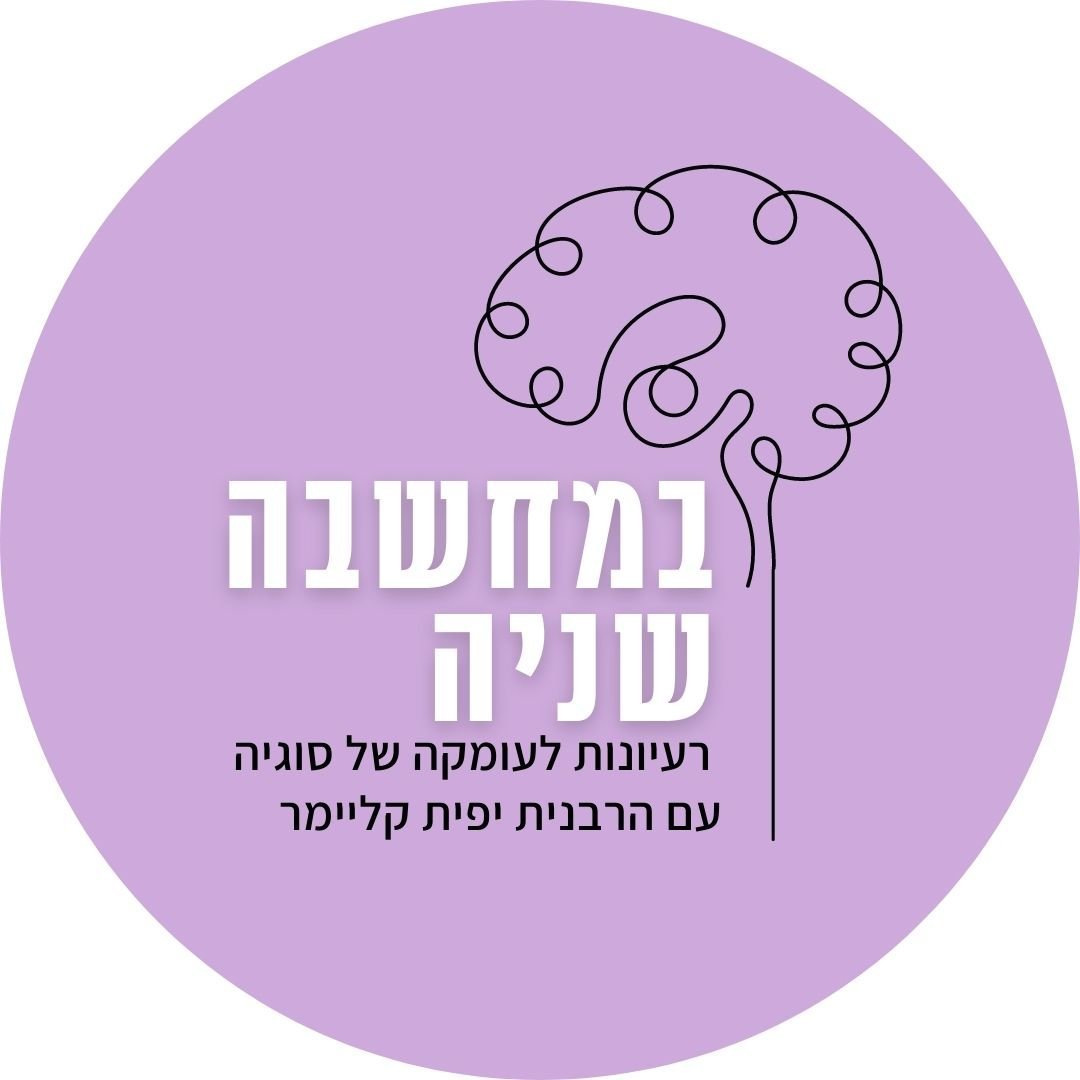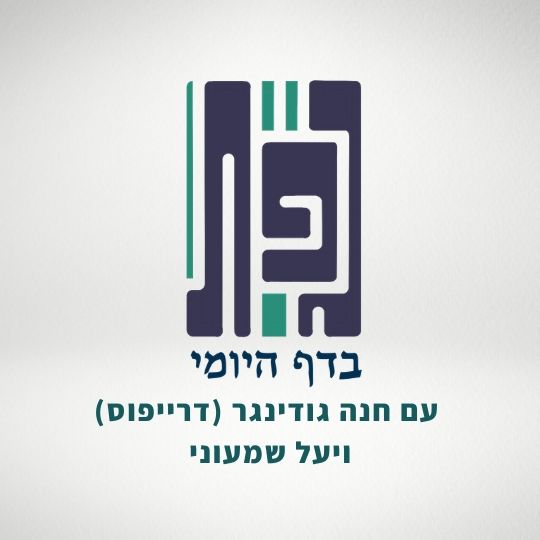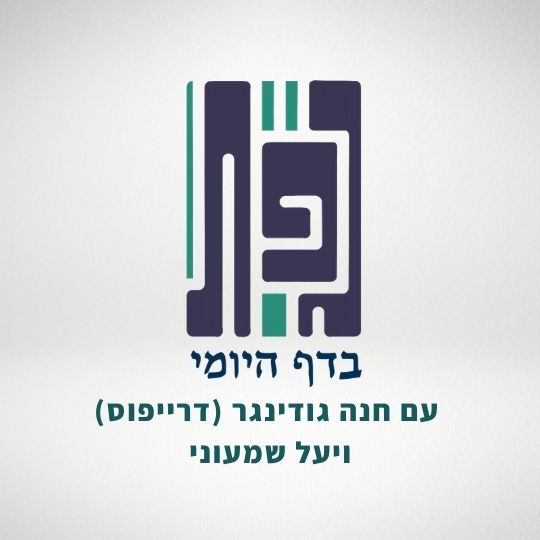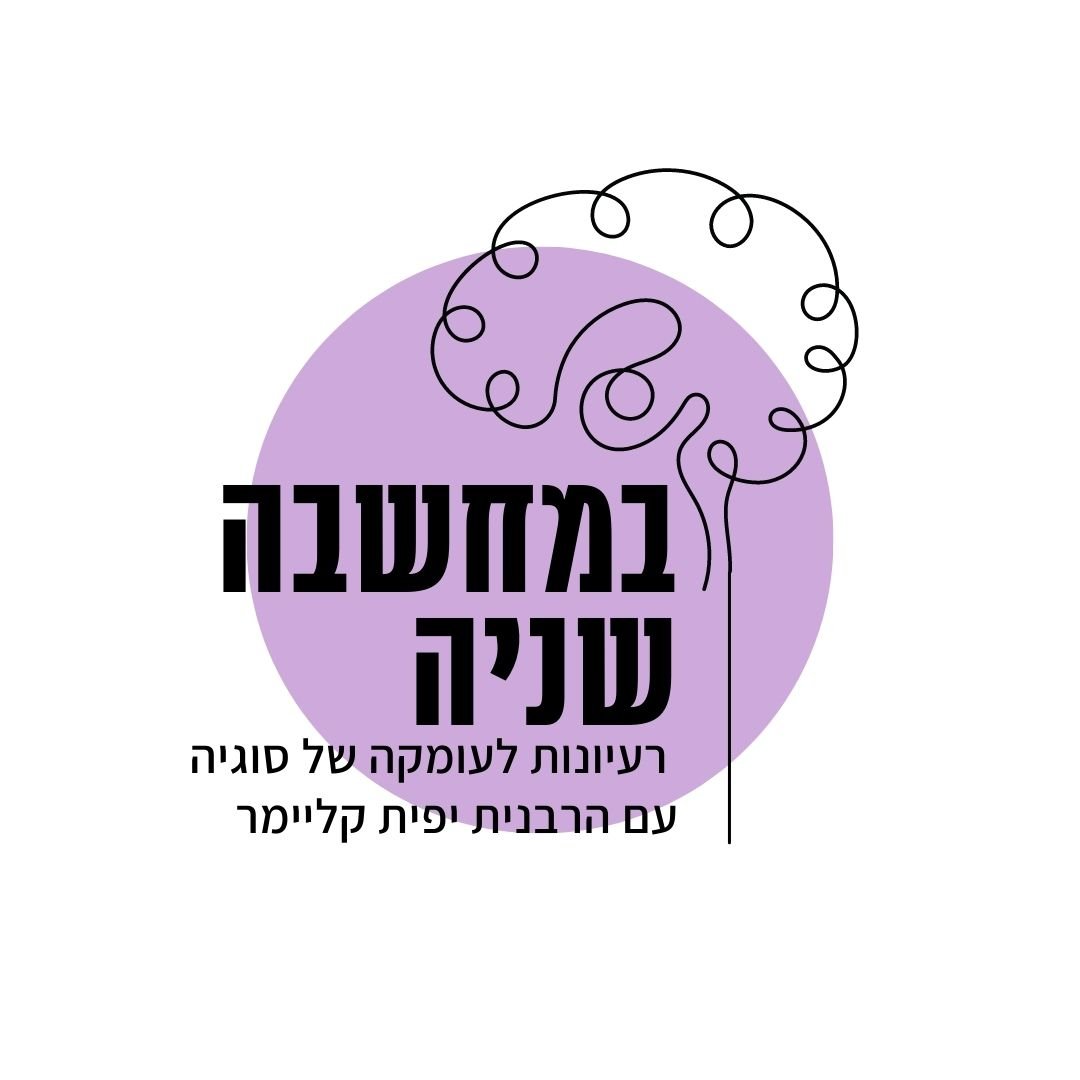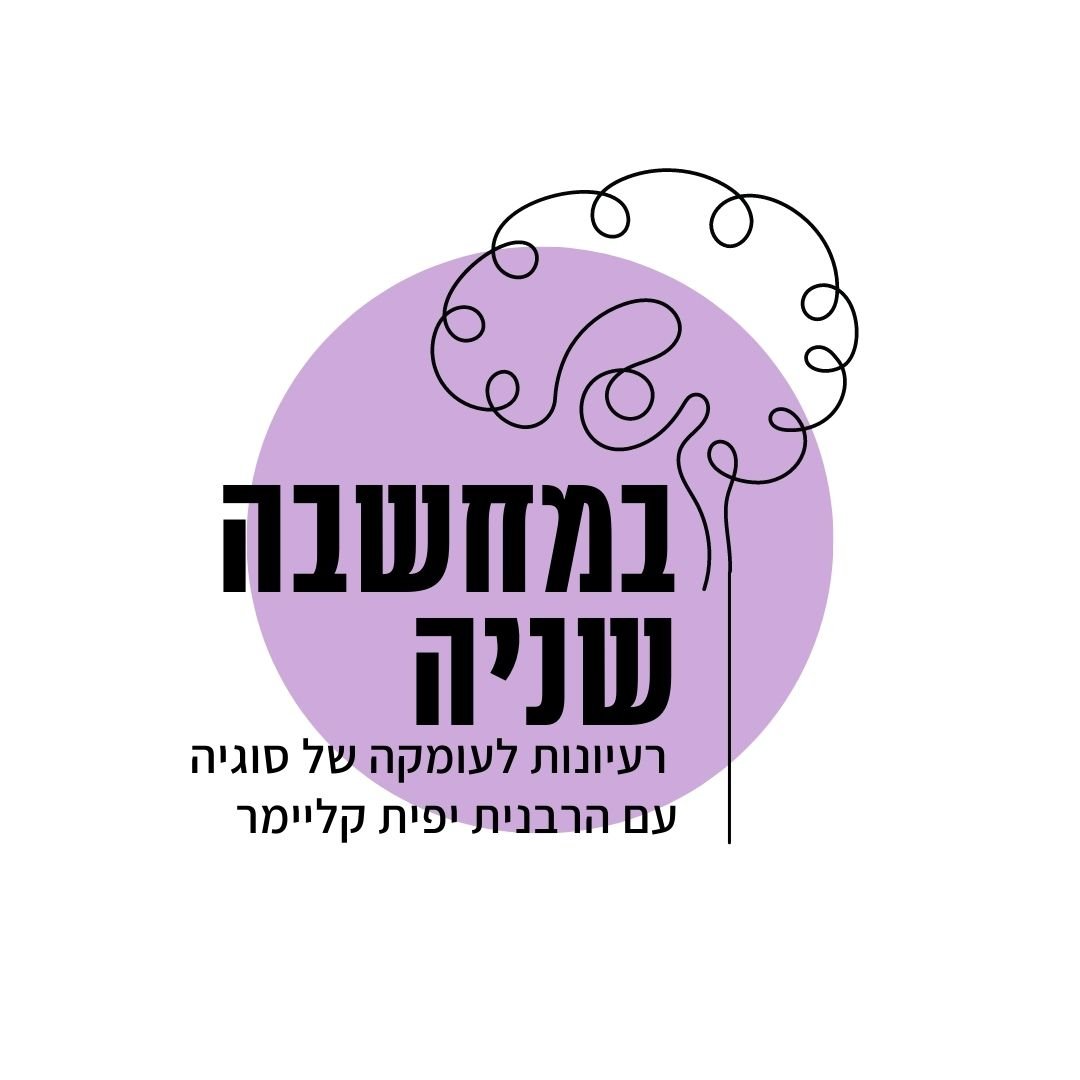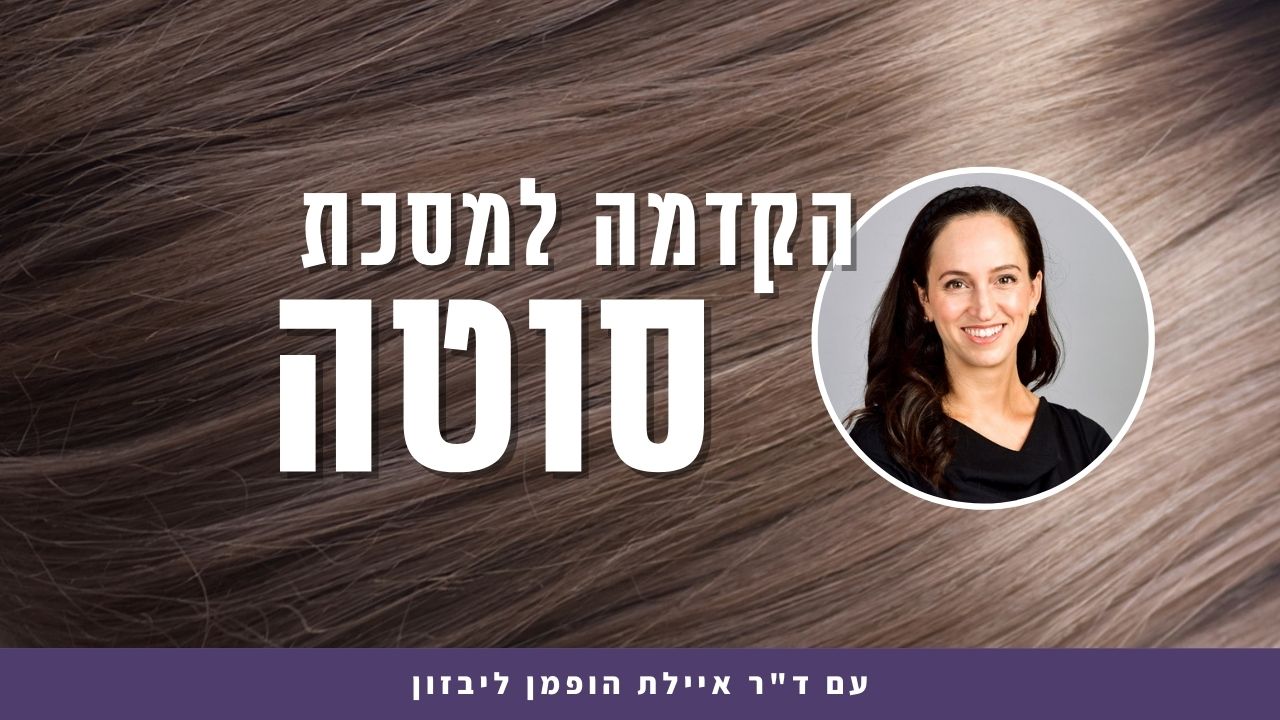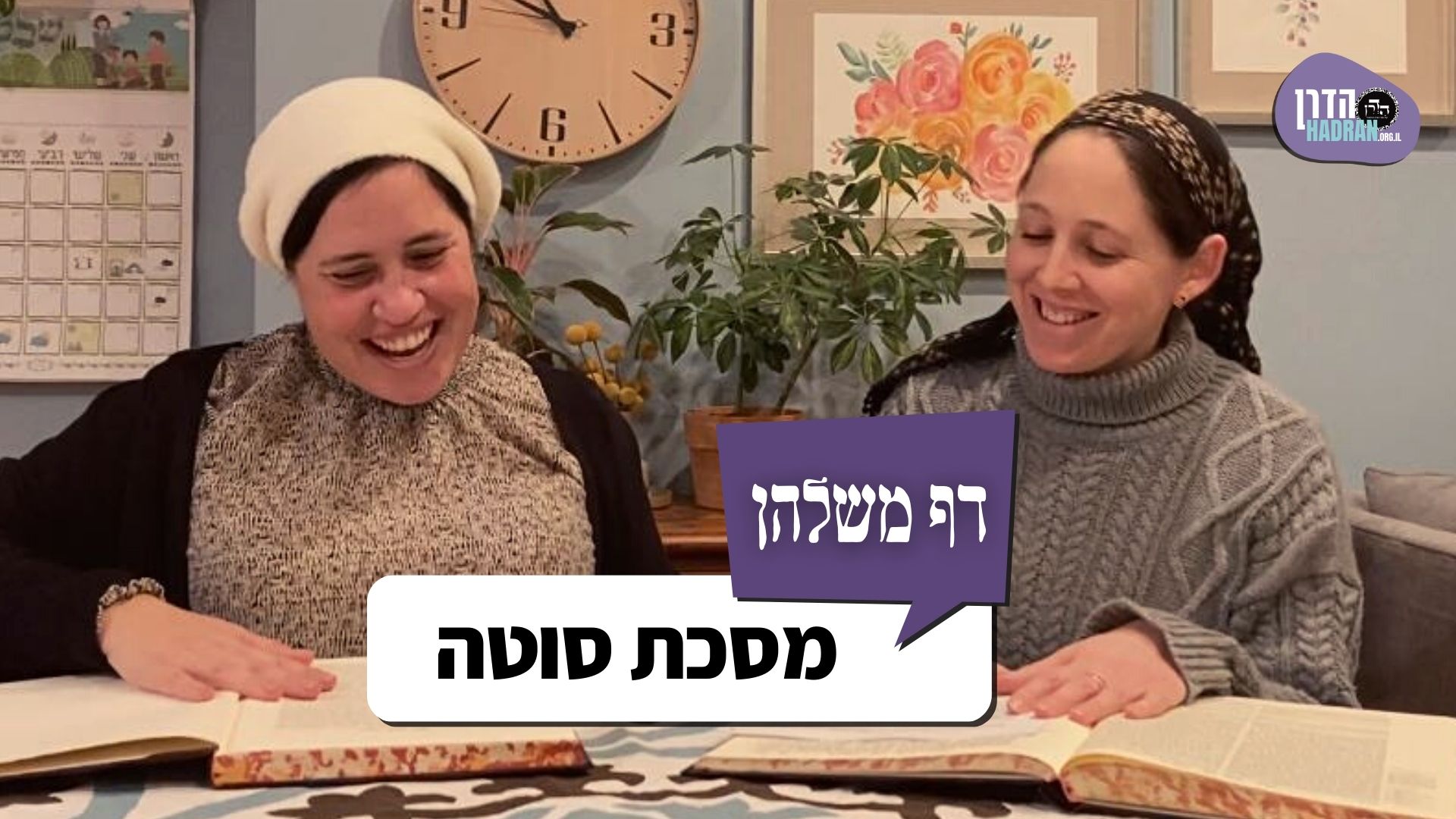הגמרא רושמת את כל הנסים שקראו באותו היום בעברו את הירדן. כשרשום בספר יהושע על הברכות וקללות כתוב "חציו” עלו להר גריזים "והחציו” עלו להר עיבל. למה כתוב "והחציו.” רב כהנא אומר שזה בא ללמד שהחלוקה להרים כאן זה אותה חלוקה שיש באפוד על כתפי הכהן גדול. אבל בברייתא יש שתי דעות לגבי חלוקת השמות באפוד ואף דעה לא תואמת דברי רב כהנא. ולכן דוחים דבריו ומציעים פירוש אחד – שאלו שעמדו בהר גריזים היו מרובים למרות ששבט לוי היה עמם וחלקם עמדו למטה, כי שבט יוסף גם היה שם והם היו מרובים. מאיפה לנו ששבטו של יוסף היו מרובים? הגמרא ממשיכה עם הרבה דרשות על יוסף.
הלימוד החודש מוקדש לרפואת פיליס הכט, גיטל פעשא בת מאשה רחל על ידי חברותיה הרבות שאוהבות ומעריכות אותה.
רוצה להקדיש שיעור?

כלים
הלימוד החודש מוקדש לרפואת פיליס הכט, גיטל פעשא בת מאשה רחל על ידי חברותיה הרבות שאוהבות ומעריכות אותה.
כלים
העמקה
רוצה להבין מה באמת קורה מתחת לפני השטח של הסוגיה?
שיעורים, פודקאסטים והרחבות של מיטב המורות שלנו יפתחו לך עוד זוויות וכיווני חשיבה.
חדשה בלימוד הגמרא?
זה הדף הראשון שלך? איזו התרגשות עצומה! יש לנו בדיוק את התכנים והכלים שיעזרו לך לעשות את הצעדים הראשונים ללמידה בקצב וברמה שלך, כך תוכלי להרגיש בנוח גם בתוך הסוגיות המורכבות ומאתגרות.
פסיפס הלומדות שלנו
גלי את קהילת הלומדות שלנו, מגוון נשים, רקעים וסיפורים. כולן חלק מתנועה ומסע מרגש ועוצמתי.
סוטה לו
כְּמַאן — כְּרַבִּי שִׁמְעוֹן.
In accordance with whose opinion is the baraita? It is in accordance with the opinion of Rabbi Shimon, who holds that the verse: “You shall keep alive no one who breathes” (Deuteronomy 20:16), is not referring to the gentiles living outside of Eretz Yisrael, because there is no concern that the Jewish people will learn “to do like all their abominations” (Deuteronomy 20:18), as these Canaanites are not located in Eretz Yisrael.
בֹּא וּרְאֵה כַּמָּה נִסִּים נַעֲשׂוּ בְּאוֹתוֹ הַיּוֹם: עָבְרוּ יִשְׂרָאֵל אֶת הַיַּרְדֵּן, וּבָאוּ לְהַר גְּרִיזִים וּלְהַר עֵיבָל יָתֵר מִשִּׁשִּׁים מִיל, וְאֵין כׇּל בְּרִיָּה יְכוֹלָה לַעֲמוֹד בִּפְנֵיהֶם, וְכׇל הָעוֹמֵד בִּפְנֵיהֶם מִיָּד נִתְרָז, שֶׁנֶּאֱמַר: ״אֶת אֵימָתִי אֲשַׁלַּח לְפָנֶיךָ וְהַמֹּתִי אֶת כׇּל הָעָם אֲשֶׁר תָּבֹא בָּהֶם וְגוֹ׳״.
§ The Gemara continues to discuss the entrance of the Jewish people into Eretz Yisrael: Come and see how many miracles were performed on that day: The Jewish people crossed the Jordan, and they arrived at Mount Gerizim and Mount Ebal, which are more than sixty mil from the river, and on that day no entity was able to stand before them. And anyone who stood before them was immediately struck with diarrhea, as it is stated: “I will send My terror before you, and will confound all the people that you encounter” (Exodus 23:27).
וְאוֹמֵר ״תִּפֹּל עֲלֵיהֶם אֵימָתָה וָפַחַד … עַד יַעֲבֹר עַמְּךָ ה׳״ — זוֹ בִּיאָה רִאשׁוֹנָה, ״עַד יַעֲבֹר עַם זוּ קָנִיתָ״ — זוֹ בִּיאָה שְׁנִיָּה.
And similarly, the verse says: “Terror and dread falls upon them; by the greatness of Your arm they are as still as a stone; till Your people pass over, Lord” (Exodus 15:16). This alludes to the first arrival of the Jewish people in Eretz Yisrael, during the period of Joshua. The verse continues: “Till the people that You have gotten pass over” (Exodus 15:16). This alludes to the second arrival, when the Jews returned to Eretz Yisrael from Babylonia after the destruction of the First Temple.
אֱמוֹר מֵעַתָּה: רְאוּיִין הָיוּ יִשְׂרָאֵל לַעֲשׂוֹת לָהֶם נֵס בְּבִיאָה שְׁנִיָּה כְּבִיאָה רִאשׁוֹנָה, אֶלָּא שֶׁגָּרַם הַחֵטְא.
Accordingly, say from now that the Jewish people were worthy of having a miracle performed for them during the second arrival, just like they were worthy of having miracles performed for them during the first arrival, but their sin caused them to enter Eretz Yisrael through a natural process, with the permission of the kings of other nations.
וְאַחַר כָּךְ הֵבִיאוּ אֶת הָאֲבָנִים, וּבָנוּ אֶת הַמִּזְבֵּחַ, וְסָדוּהוּ בְּסִיד, וְכָתְבוּ עֲלֵיהֶם אֶת כׇּל דִּבְרֵי הַתּוֹרָה בְּשִׁבְעִים לָשׁוֹן, שֶׁנֶּאֱמַר: ״בַּאֵר הֵיטֵב״,
The Gemara continues its description of the entrance into Eretz Yisrael during the period of Joshua: And afterward they brought the stones and built the altar on Mount Ebal, and plastered it over with plaster, and wrote on the stones all of the words of the Torah in seventy languages, as it is stated: “And you shall write on the stones all of the words of this law clearly elucidated” (Deuteronomy 27:8).
וְהֶעֱלוּ עוֹלוֹת וּשְׁלָמִים, וְאָכְלוּ וְשָׁתוּ וְשָׂמְחוּ, וּבֵרְכוּ וְקִלְּלוּ, וְקִיפְּלוּ אֶת הָאֲבָנִים, וּבָאוּ וְלָנוּ בַּגִּלְגָּל, שֶׁנֶּאֱמַר: ״וְהַעֲבַרְתֶּם אוֹתָם עִמָּכֶם וְהִנַּחְתֶּם אוֹתָם בַּמָּלוֹן״.
And they sacrificed burnt-offerings and peace-offerings, and they ate and drank and celebrated, and they uttered the blessings, and they uttered the curses, and they took [kippelu] the stones with them, and they arrived and slept in Gilgal, as it is stated: “And carry them over with you, and lay them down in the lodging place, where you shall lodge this night” (Joshua 4:3).
יָכוֹל בְּכׇל מָלוֹן וּמָלוֹן — תַּלְמוּד לוֹמַר: ״אֲשֶׁר תָּלִינוּ בוֹ הַלָּיְלָה״, וּכְתִיב: ״וְאֶת שְׁתֵּים עֶשְׂרֵה הָאֲבָנִים הָאֵלֶּה אֲשֶׁר לָקְחוּ וְגוֹ׳״.
One might have thought that they were required to place these stones at each and every lodging place where they stayed. Therefore, the verse states: “Where you shall lodge this night,” meaning only on that night. And it is written: “And those twelve stones, which they took out of the Jordan, Joshua set up in Gilgal” (Joshua 4:20).
תָּנָא: צִרְעָה לֹא עָבְרָה עִמָּהֶם. וְלָא? וְהָא כְּתִיב: ״וְשָׁלַחְתִּי אֶת הַצִּרְעָה לְפָנֶיךָ״.
It is taught in a baraita (Tosefta 11:10): The hornet [tzira] did not cross the Jordan with them. The Gemara asks: And did it not? But isn’t it written: “And I will send the hornet before you, which shall drive out the Hivites, and the Canaanites” (Exodus 23:28)?
אָמַר רַבִּי שִׁמְעוֹן בֶּן לָקִישׁ: עַל שְׂפַת יַרְדֵּן עָמְדָה, וְזָרְקָה בָּהֶן מָרָה. וְסִימְּתָה עֵינֵיהֶן מִלְּמַעְלָה, וְסֵירְסָתַן מִלְּמַטָּה, שֶׁנֶּאֱמַר: ״וְאָנֹכִי הִשְׁמַדְתִּי אֶת הָאֱמֹרִי מִפְּנֵיהֶם אֲשֶׁר כְּגֹבַהּ אֲרָזִים גׇּבְהוֹ וְחָסֹן הוּא כָּאַלּוֹנִים וָאַשְׁמִיד פִּרְיוֹ מִמַּעַל וְשׇׁרָשָׁיו מִתָּחַת וְגוֹ׳״.
Rabbi Shimon ben Lakish says: The hornet stood on the banks of the Jordan and threw its venom at the inhabitants of the land and it blinded their eyes from above and castrated them from below, as it is stated: “Yet I destroyed the Amorites before them, whose height was like the height of the cedars, and they were strong as the oaks; yet I destroyed their fruit from above, and their roots from beneath” (Amos 2:9).
רַב פָּפָּא אָמַר: שְׁתֵּי צְרָעוֹת הֲוַאי, חֲדָא דְּמֹשֶׁה וַחֲדָא דִּיהוֹשֻׁעַ. דְּמֹשֶׁה לָא עֲבַר, דִּיהוֹשֻׁעַ עֲבַר.
Rav Pappa said: There were two hornets. One was the hornet of Moses, which helped conquer the eastern side of the Jordan, and one was the hornet of Joshua. The hornet of Moses did not cross the Jordan, but the hornet of Joshua did cross.
שִׁשָּׁה שְׁבָטִים עָלוּ לְרֹאשׁ הַר גְּרִיזִים כּוּ׳. מַאי ״וְהַחֶצְיוֹ״? אָמַר רַב כָּהֲנָא: כְּדֶרֶךְ שֶׁחֲלוּקִין כָּאן — כָּךְ חֲלוּקִין בְּאַבְנֵי אֵפוֹד.
§ It is stated in the mishna: Six tribes ascended to the top of Mount Gerizim, as it is stated: “Half of them in front of Mount Gerizim and the half of them in front of Mount Ebal” (Joshua 8:33). The Gemara asks: What is the meaning of the term “and the half of them”? It seems to be referring to a division that already existed. Rav Kahana says: The same way that the tribes were divided up here on the mountains, so too were they divided on the stones of the ephod, a garment of the High Priest.
מֵיתִיבִי: שְׁתֵּי אֲבָנִים טוֹבוֹת הָיוּ לוֹ לְכֹהֵן גָּדוֹל עַל כְּתֵיפָיו, אַחַת מִכָּאן וְאַחַת מִכָּאן, וּשְׁמוֹת שְׁנֵים עָשָׂר שְׁבָטִים כָּתוּב עֲלֵיהֶם, שִׁשָּׁה עַל אֶבֶן זוֹ וְשִׁשָּׁה עַל אֶבֶן זוֹ, שֶׁנֶּאֱמַר: ״שִׁשָּׁה מִשְּׁמוֹתָם עַל הָאֶבֶן הָאֶחָת וְגוֹ׳״.
The Gemara raises an objection to this answer: The High Priest had two precious stones on the part of the ephod that rested on his shoulders, one on this side and one on that side, and the names of the twelve tribes were written on them, six on this stone and six on that stone, as it is stated: “Six of their names on the one stone, and the names of the six that remain on the other stone, according to their birth” (Exodus 28:10).
שְׁנִיָּה כְּתוֹלְדוֹתָם, וְלֹא רִאשׁוֹנָה כְּתוֹלְדוֹתָם — מִפְּנֵי שֶׁיְּהוּדָה מוּקְדָּם. וַחֲמִשִּׁים אוֹתִיּוֹת הָיוּ, עֶשְׂרִים וְחָמֵשׁ עַל אֶבֶן זוֹ וְעֶשְׂרִים וְחָמֵשׁ עַל אֶבֶן זוֹ.
It is derived from the verse that only the names on the second stone were written according to the order of their birth: Gad, Asher, Issachar, Zebulun, Joseph, Benjamin. But the names on the first stone were not written according to the order of their birth, as Judah was written first, and afterward came Reuben, Simeon, Levi, Dan, and Naphtali. And there were fifty letters on the two stones of the ephod, twenty-five letters on this stone and twenty-five on that stone.
רַבִּי חֲנִינָא בֶּן גַּמְלִיאֵל אוֹמֵר:
Rabbi Ḥanina ben Gamliel says:
לֹא כְּדֶרֶךְ שֶׁחֲלוּקִין בְּחוֹמֶשׁ הַפְּקוּדִים, חֲלוּקִין בְּאַבְנֵי אֵפוֹד, אֶלָּא כְּדֶרֶךְ שֶׁחֲלוּקִין בְּחוֹמֶשׁ שֵׁנִי.
The names of the tribes were not divided on the stones of the ephod the same way that they were divided in the list found at the beginning of the book of Numbers (Numbers 1:1–15). Rather they were divided the way that they were divided in the second book, i.e., Exodus (Exodus 1:2–4).
כֵּיצַד? בְּנֵי לֵאָה כְּסִידְרָן, בְּנֵי רָחֵל אֶחָד מִכָּאן וְאֶחָד מִכָּאן, וּבְנֵי שְׁפָחוֹת בָּאֶמְצַע.
How were they written? On one stone, the names of the sons of Leah were written in the order of their birth: Reuben, Simeon, Levi, Judah, Issachar, and Zebulun. On the other stone the sons of Rachel were written. One, Benjamin, was written on this side, i.e., at the bottom of the list, and one, Joseph, was written on that side, i.e., at the top of the list. And the children of the handmaids, i.e., Bilhah and Zilpah, who were Dan, Naphtali, Gad, and Asher, were written on the second stone in the middle.
וְאֶלָּא מַאי אֲנִי מְקַיֵּים ״כְּתוֹלְדֹתָם״ — כִּשְׁמוֹתָן שֶׁקָּרָא לָהֶן אֲבִיהֶן, וְלֹא כְּשֵׁמוֹת שֶׁקָּרָא לָהֶן מֹשֶׁה. ״רְאוּבֵן״, וְלֹא ״רְאוּבֵנִי״, ״שִׁמְעוֹן״, וְלֹא ״שִׁמְעוֹנִי״, ״דָּן״ וְלֹא ״הַדָּנִי״, ״גָּד״ וְלֹא ״הַגָּדִי״. תְּיוּבְתָּא דְּרַב כָּהֲנָא! תְּיוּבְתָּא.
But rather, if their names were not written in the order of their births, then how do I establish the meaning of the phrase: “According to their birth” (Exodus 28:10)? It means that their names were written according to the names that their father, Jacob, called them, and not according to the names that Moses called them. On the stones it said Reuben, and not Reubenites; Simeon, and not Simeonites; Dan, and not Danites; Gad, and not Gadites. This baraita contradicts Rav Kahana’s opinion, as according to all of the opinions in the baraita, the division of the names on the ephod is not identical to the division of the tribes on Mount Gerizim and Mount Ebal. The Gemara confirms: The refutation of the opinion of Rav Kahana is in fact a conclusive refutation.
וְאֶלָּא מַאי ״וְהַחֶצְיוֹ״? תָּנָא: — חֶצְיוֹ שֶׁל מוּל הַר גְּרִיזִים מְרוּבֶּה מֵחֶצְיוֹ שֶׁל הַר עֵיבָל, מִפְּנֵי שֶׁלֵּוִי לְמַטָּה.
The Gemara asks: Rather, what is meant by the phrase: “And the half of them facing Mount Ebal” (Joshua 8:33)? It is taught in a baraita: The use of the definitive article in the verse indicates that the smaller half of the Jewish people was on Mount Ebal. The half that was facing Mount Gerizim was larger than the half on Mount Ebal, because the tribe of Levi was included in the group that was facing Mount Gerizim, and they remained on the bottom between the two mountains.
אַדְּרַבָּה, מִפְּנֵי שֶׁלֵּוִי לְמַטָּה בָּצְרִי לְהוּ! הָכִי קָאָמַר: אַף עַל פִּי שֶׁלֵּוִי לְמַטָּה — בְּנֵי יוֹסֵף עִמָּהֶם. שֶׁנֶּאֱמַר: ״וַיְדַבְּרוּ בְּנֵי יוֹסֵף אֶת יְהוֹשֻׁעַ לֵאמֹר מַדּוּעַ נָתַתָּה לִּי נַחֲלָה גּוֹרָל אֶחָד וְחֶבֶל אֶחָד וַאֲנִי עַם רָב … וַיֹּאמֶר אֲלֵיהֶם יְהוֹשֻׁעַ אִם עַם רַב אַתָּה עֲלֵה לְךָ הַיַּעְרָה״.
The Gemara is puzzled by this statement: On the contrary, because the tribe of Levi remained on the bottom they were fewer in number. The Gemara answers: This is what the baraita is saying: Although the tribe of Levi was on the bottom, the descendants of Joseph were among them, and the tribe of Joseph was numerous, as it is stated: “And the children of Joseph spoke to Joshua, saying: Why did you give me a single lot and one part for an inheritance, seeing I am a great people, forasmuch as the Lord has blessed me thus, and Joshua said to them: If you are a great people, you should go up to the forest” (Joshua 17:14–15).
אָמַר לָהֶן: לְכוּ וְהַחְבִּיאוּ עַצְמְכֶם בַּיְּעָרִים, שֶׁלֹּא תִּשְׁלוֹט בָּכֶם עַיִן הָרָע. אֲמַרוּ לֵיהּ: זַרְעֵיהּ דְּיוֹסֵף לָא שָׁלְטָא בֵּיהּ עֵינָא בִּישָׁא, דִּכְתִיב: ״בֵּן פֹּרָת יוֹסֵף בֵּן פֹּרָת עֲלֵי עָיִן״, וְאָמַר רַבִּי אֲבָהוּ: אַל תְּהִי קוֹרֵא ״עֲלֵי עָיִן״, אֶלָּא ״עוֹלֵי עָיִן״.
The Gemara explains that Joshua said to them: Go and hide yourselves in the forests, so that the evil eye will not have dominion over you, as you are such a large number of people. The tribe of Joseph said to him: The evil eye does not have dominion over the offspring of Joseph, as it is written: “Joseph is a fruitful vine, a fruitful vine by a fountain” (Genesis 49:22), and Rabbi Abbahu says: Do not read the verse as saying: “By a fountain [alei ayin]”; rather, read it as: Those who rise above the evil eye [olei ayin], teaching that Joseph and his descendants are not susceptible to the evil eye.
רַבִּי יוֹסֵי בְּרַבִּי חֲנִינָא אֲמַר, מֵהָכָא: ״וְיִדְגּוּ לָרֹב בְּקֶרֶב הָאָרֶץ״, מָה דָּגִים שֶׁבַּיָּם — מַיִם מְכַסִּין עֲלֵיהֶן וְאֵין הָעַיִן שׁוֹלֶטֶת בָּהֶן, אַף זַרְעוֹ שֶׁל יוֹסֵף — אֵין הָעַיִן שׁוֹלֶטֶת בָּהֶן.
The Gemara cites an alternative source for the assertion that the evil eye holds no sway over Joseph and his descendants: Rabbi Yosei, son of Rabbi Ḥanina, said that it is derived from here: Jacob blessed Joseph’s children and said: “And let them grow [veyidgu] into a multitude in the midst of the earth” (Genesis 48:16). Just as with regard to fish [dagim] in the sea, waters cover them and the evil eye therefore has no dominion over them, so too, with regard to Joseph’s descendants, the evil eye has no dominion over them.
הָנֵי חֲמִשִּׁים אוֹתִיּוֹת? חֲמִשִּׁים נְכֵי חֲדָא הָוְיָין! אָמַר רַבִּי יִצְחָק: יוֹסֵף הוֹסִיפוּ לוֹ אוֹת אַחַת, שֶׁנֶּאֱמַר: ״עֵדוּת בִּיהוֹסֵף שָׂמוֹ בְּצֵאתוֹ עַל אֶרֶץ מִצְרָיִם״.
The Gemara asks with regard to the baraita that contradicts Rav Kahana’s opinion: Are these names of the tribes, which were written on the ephod, composed of a total of fifty letters? There are only forty-nine. Rabbi Yitzḥak says: They added one letter to the name of Joseph [Yosef] when it was written on the ephod, as it is stated: “He appointed it in Joseph [Yehosef] for a testimony when He went forth against the land of Egypt” (Psalms 81:6).
מַתְקֵיף לַהּ רַב נַחְמָן בַּר יִצְחָק: ״כְּתוֹלְדֹתָם״ בָּעֵינַן! אֶלָּא: כׇּל הַתּוֹרָה כּוּלָּהּ ״בִּנְיָמִן״ כְּתִיב, וְהָכָא ״בִּנְיָמִין״ שָׁלֵם, כְּדִכְתִיב: ״וְאָבִיו קָרָא לוֹ בִנְיָמִין״.
Rav Naḥman bar Yitzḥak objects to this: We require the names to be written “according to their birth,” and Joseph was not called Yehosef from birth. Rather, the explanation is as follows: Throughout the entire Torah, the name of Benjamin is written without a second letter yod between the letters mem and nun, and here, where he is born, Benjamin is written in full, spelled with a second yod. As it is written: “But his father called him Benjamin” (Genesis 35:18). Therefore, his name was written on the ephod with a second yod, “according to his birth.”
אָמַר רַב חָנָא בַּר בִּיזְנָא אָמַר רַבִּי שִׁמְעוֹן חֲסִידָא: יוֹסֵף שֶׁקִּידֵּשׁ שֵׁם שָׁמַיִם בַּסֵּתֶר — הוֹסִיפוּ עָלָיו אוֹת אַחַת מִשְּׁמוֹ שֶׁל הַקָּדוֹשׁ בָּרוּךְ הוּא, יְהוּדָה שֶׁקִּידֵּשׁ שֵׁם שָׁמַיִם בְּפַרְהֶסְיָא — נִקְרָא כּוּלּוֹ עַל שְׁמוֹ שֶׁל הַקָּדוֹשׁ בָּרוּךְ הוּא.
§ Rav Ḥana bar Bizna says that Rabbi Shimon Ḥasida says: Joseph, who sanctified the name of Heaven in private, had one letter of the name of the Holy One, Blessed be He, the letter heh, added to his name. Whereas in the case of Judah, who sanctified the name of Heaven in public [befarhesya] at the Red Sea during the exodus from Egypt, merited that his entire name is called by the name of the Holy One, Blessed be He, as the entire four-letter name of God can be found within Judah’s name.
יוֹסֵף מַאי הִיא — דִּכְתִיב: ״וַיְהִי כְּהַיּוֹם הַזֶּה וַיָּבֹא הַבַּיְתָה לַעֲשׂוֹת מְלַאכְתּוֹ״, אָמַר רַבִּי יוֹחָנָן: מְלַמֵּד שֶׁשְּׁנֵיהֶם לִדְבַר עֲבֵירָה נִתְכַּוְּונוּ. ״וַיָּבֹא הַבַּיְתָה לַעֲשׂוֹת מְלַאכְתּוֹ״. רַב וּשְׁמוּאֵל, חַד אָמַר: לַעֲשׂוֹת מְלַאכְתּוֹ מַמָּשׁ, וְחַד אָמַר: לַעֲשׂוֹת צְרָכָיו נִכְנַס.
The Gemara explains: What is the situation where Joseph sanctified God’s name in private? As it is written: “And it came to pass on a certain day, when he went into the house to do his work” (Genesis 39:11). Rabbi Yoḥanan says: This teaches that both Joseph and Potiphar’s wife stayed in the house, as they intended to perform a matter of sin. With regard to the phrase “when he went into the house to do his work,” Rav and Shmuel engage in a dispute with regard to its meaning. One says: It means that he went into the house to do his work, literally. And one says: He entered the house in order to fulfill his sexual needs with her.
״וְאֵין אִישׁ מֵאַנְשֵׁי הַבַּיִת וְגוֹ׳״, אֶפְשָׁר בַּיִת גָּדוֹל כְּבֵיתוֹ שֶׁל אוֹתוֹ רָשָׁע לֹא הָיָה בּוֹ אִישׁ?! תָּנָא דְּבֵי רַבִּי יִשְׁמָעֵאל: אוֹתוֹ הַיּוֹם יוֹם חַגָּם הָיָה, וְהָלְכוּ כּוּלָּן לְבֵית עֲבוֹדָה זָרָה שֶׁלָּהֶם, וְהִיא אָמְרָה לָהֶן חוֹלָה הִיא, אָמְרָה: אֵין לִי יוֹם שֶׁנִּיזְקָק לִי יוֹסֵף כַּיּוֹם הַזֶּה.
The verse continues: “And there was none of the men of the house there within” (Genesis 39:11). The Gemara asks: Is it possible that in such a large and important house like the house of that wicked man that no one was in there? The school of Rabbi Yishmael taught: That day was their festival day and they all went to their house of idol worship; and she told them that she was sick and could not go, as she said to herself: I have no day on which Joseph will attend to me like this day.
״וַתִּתְפְּשֵׂהוּ בְּבִגְדוֹ לֵאמֹר וְגוֹ׳״, בְּאוֹתָהּ שָׁעָה בָּאתָה דְּיוֹקְנוֹ שֶׁל אָבִיו וְנִרְאֲתָה לוֹ בַּחַלּוֹן, אָמַר לוֹ יוֹסֵף! עֲתִידִין אַחֶיךָ שֶׁיִּכָּתְבוּ עַל אַבְנֵי אֵפוֹד וְאַתָּה בֵּינֵיהֶם, רְצוֹנְךָ שֶׁיִּמָּחֶה שִׁמְךָ מִבֵּינֵיהֶם, וְתִקָּרֵא רוֹעֶה זוֹנוֹת? דִּכְתִיב: ״וְרֹעֶה זוֹנוֹת יְאַבֶּד הוֹן״.
The verse states: “And she caught him by his garment, saying: Lie with me” (Genesis 39:12). At that moment his father’s image [deyokeno] came and appeared to him in the window. The image said to him: Joseph, the names of your brothers are destined to be written on the stones of the ephod, and you are to be included among them. Do you desire your name to be erased from among them, and to be called an associate [ro’eh] of promiscuous women? As it is written: “But he who keeps company with harlots wastes his riches” (Proverbs 29:3), as he loses his honor, which is more valuable than wealth.
מִיָּד — ״וַתֵּשֶׁב בְּאֵיתָן קַשְׁתּוֹ״, אָמַר רַבִּי יוֹחָנָן מִשּׁוּם רַבִּי מֵאִיר: שֶׁשָּׁבָה קַשְׁתּוֹ לְאֵיתָנָהּ. ״וַיָּפֹזּוּ זְרוֹעֵי יָדָיו״ — נָעַץ יָדָיו בַּקַּרְקַע וְיָצְאָה שִׁכְבַת זַרְעוֹ מִבֵּין צִיפּוֹרְנֵי יָדָיו.
Immediately: “And his bow abode [teishev] firm” (Genesis 49:24). Rabbi Yoḥanan says in the name of Rabbi Meir: This means that his bow, i.e., his penis, returned [shava] to its strength, as he overcame his desire. The verse about Joseph continues: “And the arms of his hands were made supple” (Genesis 49:24), meaning that he dug his hands into the ground and his semen was emitted between his fingernails.
״מִידֵּי אֲבִיר יַעֲקֹב״, מִי גָּרַם לוֹ שֶׁיֵּחָקֵק עַל אַבְנֵי אֵפוֹד — אֶלָּא אֲבִיר יַעֲקֹב. ״מִשָּׁם רֹעֶה אֶבֶן יִשְׂרָאֵל״, מִשָּׁם זָכָה וְנַעֲשָׂה רוֹעֶה, שֶׁנֶּאֱמַר: ״רוֹעֵה יִשְׂרָאֵל הַאֲזִינָה נֹהֵג כַּצֹּאן יוֹסֵף״.
“By the hands of the Mighty One of Jacob” (Genesis 49:24): Who caused his name to be etched onto the stones of the ephod? It was only the might of Jacob. “From there, from the Shepherd, the Stone of Israel” (Genesis 49:24) means: From there, because of Joseph’s ability to withstand this trial, he merited to become a shepherd [ro’eh] of the Jewish people, as it is stated: “Listen, O Shepherd of Israel, who leads like the flock of Joseph” (Psalms 80:2).
תַּנְיָא: הָיָה רָאוּי יוֹסֵף לָצֵאת מִמֶּנּוּ שְׁנֵים עָשָׂר שְׁבָטִים כְּדֶרֶךְ שֶׁיָּצְאוּ מִיַּעֲקֹב אָבִיו, שֶׁנֶּאֱמַר: ״אֵלֶּה תֹּלְדוֹת יַעֲקֹב יוֹסֵף״, אֶלָּא שֶׁיָּצָא שִׁכְבַת זַרְעוֹ מִבֵּין צִיפּוֹרְנֵי יָדָיו. וְאַף עַל פִּי כֵן, יָצְאוּ מִבִּנְיָמִין אָחִיו, וְכוּלָּן נִקְרְאוּ עַל שְׁמוֹ, שֶׁנֶּאֱמַר: ״וּבְנֵי בִנְיָמִן בֶּלַע וָבֶכֶר וְאַשְׁבֵּל וְגוֹ׳״.
It is taught in a baraita: Joseph was deserving of having twelve tribes descend from him, the same as twelve tribes descended from his father Jacob, as it is stated: “These are the generations of Jacob, Joseph” (Genesis 37:2). This implies that everything that happened to Jacob was destined to happen to Joseph. However, he did not merit this because his semen was emitted from between his fingernails. And even so, the offspring that were meant to descend from him descended from his brother Benjamin, who had ten sons. And they were all named after Joseph, as it is stated: “And the sons of Benjamin: Bela, and Becher, and Ashbel, Gera, and Naaman, Ehi, and Rosh, Muppim, and Huppim, and Ard” (Genesis 46:21).
״בֶּלַע״ — שֶׁנִּבְלַע בֵּין הָאוּמּוֹת, ״וּבֶכֶר״ — בְּכוֹר לְאִמּוֹ הָיָה, ״וְאַשְׁבֵּל״ — שֶׁשְּׁבָאוֹ אֵל, ״גֵּרָא״ — שֶׁגָּר בְּאַכְסַנְיוֹת,
The Gemara explains how each name relates to Joseph: Bela was named after Joseph, who was swallowed [nivla] among the nations. And Becher received that name because Joseph was the firstborn [bekhor] of his mother, Rachel. And Ashbel received his name because God sent Joseph into captivity [shevao El] in Egypt. Gera was named after Joseph, who dwelled [gar] in a foreign land [akhsaneyut].
״וְנַעֲמָן״ — שֶׁנָּעִים בְּיוֹתֵר, ״אֵחִי וָרֹאשׁ״ — אָחִי הוּא וְרֹאשִׁי הוּא, ״מֻפִּים וְחֻפִּים״ — הוּא לֹא רָאָה בְּחוּפָּתִי וַאֲנִי לֹא רָאִיתִי בְּחוּפָּתוֹ, ״וָאָרְדְּ״ — שֶׁיָּרַד לְבֵין אוּמּוֹת הָעוֹלָם. אִיכָּא דְּאָמְרִי: ״וָאָרְדְּ״ — שֶׁפָּנָיו דּוֹמִין לְוֶורֶד.
And Naaman was called that because Joseph was extremely pleasing [na’im]. Ehi and Rosh received these names, as Benjamin said: Joseph is my brother [aḥi] and my leader [roshi]. Benjamin named his sons Muppim and Huppim, as Benjamin said: Joseph did not see my wedding canopy [ḥuppa] and I did not see his wedding canopy. And Ard was named after Joseph, who descended [yarad] to the lands of the nations of the world. Some say that the name Ard means that Joseph’s face was similar in its beauty to a rose [vered].
אָמַר רַבִּי חִיָּיא בַּר אַבָּא אָמַר רַבִּי יוֹחָנָן: בְּשָׁעָה שֶׁאָמַר לוֹ פַּרְעֹה לְיוֹסֵף ״וּבִלְעָדֶיךָ לֹא יָרִים אִישׁ אֶת יָדוֹ וְגוֹ׳״, אָמְרוּ אִיצְטַגְנִינֵי פַרְעֹה: עֶבֶד שֶׁלְּקָחוֹ רַבּוֹ בְּעֶשְׂרִים כֶּסֶף תַּמְשִׁילֵהוּ עָלֵינוּ? אָמַר לָהֶן: גִּנּוּנֵי מַלְכוּת אֲנִי רוֹאֶה בּוֹ.
Rabbi Ḥiyya bar Abba says that Rabbi Yoḥanan says: When Pharaoh said to Joseph: “And without you no man shall lift up his hand or his foot in all the land of Egypt” (Genesis 41:44), Pharaoh’s astrologers said: You will appoint a slave whose master bought him for twenty silver coins to rule over us? He said to them: I perceive royal characteristics [ginnunei malkhut] in him and see that he was not initially a slave.
אָמְרוּ לוֹ: אִם כֵּן, יְהֵא יוֹדֵעַ בְּשִׁבְעִים לָשׁוֹן! בָּא גַּבְרִיאֵל וְלִימְּדוֹ שִׁבְעִים לָשׁוֹן. לָא הֲוָה קָגָמַר. הוֹסִיף לוֹ אוֹת אַחַת מִשְּׁמוֹ שֶׁל הַקָּדוֹשׁ בָּרוּךְ הוּא וְלָמַד, שֶׁנֶּאֱמַר: ״עֵדוּת בִּיהוֹסֵף שָׂמוֹ בְּצֵאתוֹ עַל אֶרֶץ מִצְרָיִם שְׂפַת לֹא יָדַעְתִּי אֶשְׁמָע״. וּלְמָחָר, כֹּל לִישָּׁנָא דְּאִישְׁתַּעִי פַּרְעֹה בַּהֲדֵיהּ, אַהְדַּר לֵיהּ.
They said to him: If that is so and he is a child of royalty, he should know the seventy languages that all kings’ children learn. The angel Gabriel then came and taught him the seventy languages, but he could not learn all of them. Gabriel then added one letter, the letter heh, to Joseph’s name from the name of the Holy One, Blessed be He, and then he was able to learn the languages, as it is stated: “He appointed it in Joseph [Yehosef] for a testimony, when he went forth against the land of Egypt, the speech of one that I did not know I heard” (Psalms 81:6). And the next day, when he appeared before Pharaoh, in every language that Pharaoh spoke with him, he answered him.
אִישְׁתַּעִי אִיהוּ בִּלְשׁוֹן הַקֹּדֶשׁ, לָא הֲוָה קָא יָדַע מַאי הֲוָה אָמַר. אֲמַר לֵיהּ: אַגְמַרִי. אַגְמְרֵיהּ וְלָא גְּמַר. אֲמַר לֵיהּ: אִישְׁתְּבַע לִי דְּלָא מְגַלֵּית. אִישְׁתְּבַע לוֹ.
Joseph then spoke in the sacred tongue, Hebrew, and Pharaoh did not know what he was saying. Pharaoh said to him: Teach me that language. He taught him, but he could not learn it. Pharaoh said to him: Take an oath for my benefit that you will not reveal that I do not know this language. He took an oath for his benefit.
כִּי אֲמַר לֵיהּ ״אָבִי הִשְׁבִּיעַנִי לֵאמֹר״, אֲמַר לֵיהּ: זִיל אִיתְּשִׁיל אַשְּׁבוּעֲתָךְ. אֲמַר לֵיהּ: וְאִיתְּשִׁיל נָמֵי אַדִּידָךְ. וְאַף עַל גַּב דְּלָא נִיחָא לֵיהּ, אֲמַר לֵיהּ: ״עֲלֵה וּקְבֹר אֶת אָבִיךָ כַּאֲשֶׁר הִשְׁבִּיעֶךָ״.
Years later, when Joseph said to Pharaoh: “My father made me swear, saying” (Genesis 50:5) that I would bury him in Eretz Yisrael, Pharaoh said to him: Go request the dissolution of your oath. Joseph said to him: And should I also request dissolution for the oath that I took for your benefit? And consequently, even though Pharaoh was not amenable to letting Joseph go, he worried that Joseph would then request dissolution for the oath that he had taken for his benefit, and Pharaoh therefore said to him: “Go up and bury your father according to what he made you swear” (Genesis 50:6).
יְהוּדָה מַאי הִיא? דְּתַנְיָא, הָיָה רַבִּי מֵאִיר אוֹמֵר: כְּשֶׁעָמְדוּ יִשְׂרָאֵל עַל הַיָּם הָיוּ שְׁבָטִים מְנַצְּחִים זֶה עִם זֶה, זֶה אוֹמֵר: אֲנִי יוֹרֵד תְּחִלָּה לַיָּם, וְזֶה אוֹמֵר: אֲנִי יוֹרֵד תְּחִלָּה לַיָּם, קָפַץ
§ What was the incident where Judah sanctified God’s name in public? As it is taught in a baraita that Rabbi Meir would say: When the Jewish people stood at the Red Sea, the tribes were arguing with one other. This one was saying: I am going into the sea first, and that one was saying: I am going into the sea first. Then, in jumped
